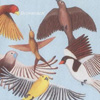 The defining moment of an album is frequently its closer. It's the last chance to make a lasting impression on the listener that can turn a good album into a timeless classic. Looking back on the 1990s, 'Millions Now Living Will Never Die' ended with the lasting impression of "Along the Banks of Rivers," a tune which differed so much from the others on that record but was strong enough to leave many breathless. Without that unpredictable variety and solid strength that came with the borderline out-of-place "Banks," it's almost unsurprising that when asked about Tortoise, their subsequent albums, 'TNT' and 'Standards' rarely are mentioned as being as globally important.
The defining moment of an album is frequently its closer. It's the last chance to make a lasting impression on the listener that can turn a good album into a timeless classic. Looking back on the 1990s, 'Millions Now Living Will Never Die' ended with the lasting impression of "Along the Banks of Rivers," a tune which differed so much from the others on that record but was strong enough to leave many breathless. Without that unpredictable variety and solid strength that came with the borderline out-of-place "Banks," it's almost unsurprising that when asked about Tortoise, their subsequent albums, 'TNT' and 'Standards' rarely are mentioned as being as globally important.
Sure, critics blamed it on the times and trends of instrumental "post-rock" music, but listening to any album Doug McCombs leads as Brokeback—exploiting the familiar soft, delicate, low-rumbling sound as heard on "Banks"—I can safely say that this type of flavor was surely left too far out of the mix. As the core duo of Brokeback (McCombs and Noel Kupersmith) are bassists, it's unsurprising that Brokeback recordings are bottom-heavy, with the distant thunder-esque a double-bass matched with the sound of a twanging baritone guitar or six-string bass. The duo rarely stop at only the low end, often allowing the songs to be colored with simple chimes, electronic rhythms, found sounds, guitar melodies, subtle horns, or angelic voices. On the whole, Brokeback albums consistently remain hovering in a point of serenity from start to finish, not entirely unlike an almost motionless bird, gracefully suspended in the wind (although the cover image has a lot of birds that look like they're crashing!). This album is no exception, and no surprise, as it maintains the serenity despite the stylistic changes from song to song. 'The Bird' is garnished with electric glitch beat-driven songs, beat-less pieces like the albums's all-too-quickly-fading opener, "From the Black Current," which combines a bowed double bass, bowed cymbal sound and twanging bass 6, and the voices of Stereolab's Mary and Laetitia in "Name's Winston, Friends Call Me James," and the catchy "In the Reeds," whose la-la melody can easily run around the head for hours. While there seems to be more experimentation this time around, there's nothing shocking about it, and this isn't a bad thing. The high quality of well-crafted melodies from previous releases is thankfully intact. If it's even more variety that's sought, program the songs between Tortoise tracks, but if something peaceful and lulling is more desired, this album can take the lead just fine.
Read More

